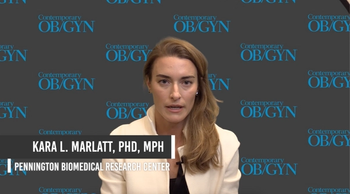
The US Food and Drug Administration (FDA) has amended the emergency use authorization of the Pfizer/BioNTech vaccine to include children aged 5 to 11 years.

The US Food and Drug Administration (FDA) has amended the emergency use authorization of the Pfizer/BioNTech vaccine to include children aged 5 to 11 years.

Sara Hurvitz, MD, discusses the coopERA study and how these data, along with findings from other clinical trials, could lead to significant changes in treatment for patients with ER-positive/HER2-negative breast cancer.

Here's what you missed this week on Contemporary OB/GYN®.

Oral contraceptives are not linked to early natural menopause, according to a population-based study in the journal Human Reproduction.

The U.S. Supreme Court has agreed to review Texas’ controversial abortion ban on Nov. 1. However, they refused to block the law during the examination process, during which they will decide whether the Department of Justice has the right to sue to block the law.

Whether you practice in Texas or not, the strict abortion ban may be an influencing factor for many abortion providers.

Medically underserved and minority breast cancer survivors experienced improved outcomes and quality of life after participating in community-based physical activity programs, according to recent study results.

Dr. Aljaras talks about the importance of focusing on diet when examining irritable bowel syndrome.

Patients are looking for user-friendly technology.

Age of first menarche has long been seen as a girl's start to puberty, but breast development may be a better fit.

The immuno-oncology company Agenus has made the decision to withdraw its biologic license application for the use of the PD-1 inhibitor balstilimab in patients with recurrent or metastatic cervical cancer who experienced disease progression on, or after, chemotherapy.

Hospitals should put you in the pink, not in the red.

It's been a busy week for the Contemporary OB/GYN® team.

UnitedHealthcare’s newly launched virtual first plan is one part of a push by the industry.

Seqirus’s FLUCELVAX® cell-based quadrivalent influenza vaccine has been approved to expand the age indication to children as young as 6 months of age by the US Food and Drug Administration.

Contemporary OB/GYN® covers a wide range of topics for the practicing ob/gyn.

In this episode, Angie DeRosa spoke with Michael Krychman, MD about how physicians are coping with COVID-19.

Analysis of data from 83k matched pairs suggests statin initiation could increase a patient's odds of diabetes progression, including need for new glucose-lowering medications and new insulin use.

A pair of studies provide insight into the increased risk of dysglycemia among women with PCOS and the potential influence of combined oral contraceptive pills on this risk in a population-based cohort.

In an analysis of SWAN data, investigators found changes in menstrual cycle length within the 5 years preceding a woman's final menstrual period was associated with changes in carotid intima-media thickness and brachial-ankle pulse wave velocity.

Data analytics allows providers to gain insights from performance management measures and metrics that hold the clues to financial viability under risk-based and pay-for-performance contracts. By embracing advanced analytics, hospitals and health systems can accelerate their path to value.

The advisory panel is also scheduled to discuss Merck antiviral pill late next month.

Here's what to look for this week on Contemporary OB/GYN®.

Telehealth has become increasingly popular as a result of the pandemic, which makes accurate coding for such visits more important than ever. A session at the virtual 2021 American Academy of Pediatrics National Conference & Exhibition covers appropriate coding.

It was a busy week for the Contemporary OB/GYN team.

Telehealth offers a whole new way to reach out to adolescent patients for critical conversations on sexual health, according to a session at the virtual 2021 American Academy of Pediatrics National Conference & Exhibition.

Researchers examined the effects of severe acute respiratory infections on pregnancy and reported some concerning findings.

Gloria A. Bachmann, MD, MMS sat down with Michael Krychman, MD, at the North American Menopause Society (NAMS) Annual Meeting to talk about telemedicine and her work providing trauma-informed care to women in prison.

Kara L. Marlatt, PhD, MPH, tells Contemporary OB/GYN® about the exciting new anti-obesity and weight loss drugs to watch for.